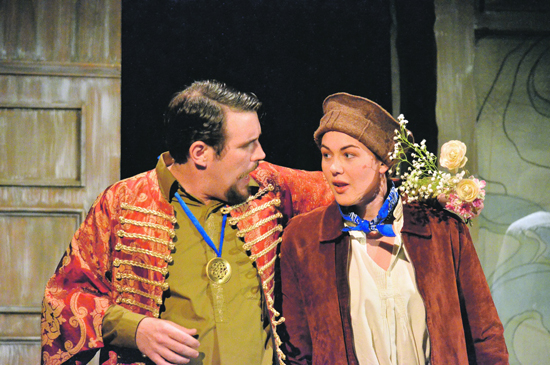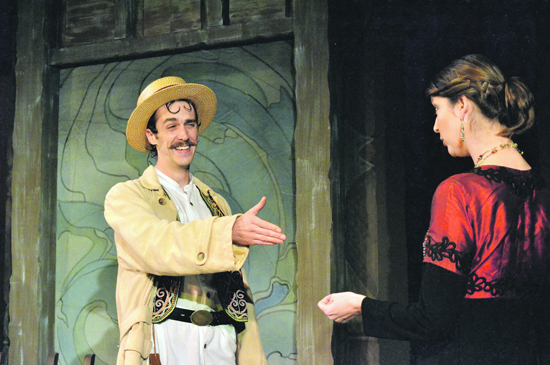| | Published June 8th, 2011
| THT's Twelfth Night, Just Right
| | By Andrea A. Firth |  | | Dennis Markham (left) as Duke Orsino and Kate Jopson as Cesario (Viola) in Town Hall Theatre Company's production of Shakespeare's Twelfth Night.
Photo Jay Yamada
|
Town Hall Theatre's (THT) production of Twelfth Night has all the right ingredients: a classic tale, one of Shakespeare's joyous comedies, a cast of high-quality actors, and a liberal dose of playfulness.
 As is often the case with Shakespeare, the central theme of Twelfth Night is love-obvious but never simple. In brief, Duke Orsino loves Olivia, who in turn loves the male page Cesario, who is actually Viola, a woman, and Viola loves Duke Orsino, who thinks she is the young man Cesario. And to top it off, Viola has a twin brother Sebastian, who bears a remarkable resemblance to her alter ego Cesario, who comes on the scene in the last half of the play. It sounds complicated, but THT's performers adeptly navigate the audience through the play's complicated love triangle (or it may be a quadrangle) which is rife with disguises, mistaken identity, secret messages, and madness.
As is often the case with Shakespeare, the central theme of Twelfth Night is love-obvious but never simple. In brief, Duke Orsino loves Olivia, who in turn loves the male page Cesario, who is actually Viola, a woman, and Viola loves Duke Orsino, who thinks she is the young man Cesario. And to top it off, Viola has a twin brother Sebastian, who bears a remarkable resemblance to her alter ego Cesario, who comes on the scene in the last half of the play. It sounds complicated, but THT's performers adeptly navigate the audience through the play's complicated love triangle (or it may be a quadrangle) which is rife with disguises, mistaken identity, secret messages, and madness.
 The audience is kept smugly "in the know" as to who is who and who loves whom and is frequently entertained by the antics of Olivia's plucky and cunning handmaid Maria, her rowdy, drunken uncle Sir Toby, the foolish Sir Andrew, and the dour, self-absorbed Malvolio.
The audience is kept smugly "in the know" as to who is who and who loves whom and is frequently entertained by the antics of Olivia's plucky and cunning handmaid Maria, her rowdy, drunken uncle Sir Toby, the foolish Sir Andrew, and the dour, self-absorbed Malvolio.
 One of the play's highlights is the performance of the sharp-witted clown Feste by THT's Artistic Director Clive Worsley. It's worth going to the play just to hear Worsley's beautiful renditions of the story in song as he ably plucks the ukulele. As Worsley has frequently done since he arrived on the scene at THT two and half years ago, he recruited another notable member of the Bay Area theater scene, Soren Oliver, to direct THT's Twelfth Night. Oliver directed the play Art at THT last season and was excited to return to Town Hall to undertake Shakespeare. One of the play's highlights is the performance of the sharp-witted clown Feste by THT's Artistic Director Clive Worsley. It's worth going to the play just to hear Worsley's beautiful renditions of the story in song as he ably plucks the ukulele. As Worsley has frequently done since he arrived on the scene at THT two and half years ago, he recruited another notable member of the Bay Area theater scene, Soren Oliver, to direct THT's Twelfth Night. Oliver directed the play Art at THT last season and was excited to return to Town Hall to undertake Shakespeare.
 The subject of gender-mistaken, bending, and otherwise-is often discussed with Twelfth Night, and the play is sometimes referred to as one of Shakespeare's transvestite comedies. But Oliver refuses to go down that path; he does not see the play as a manifesto about gender identity. "This was a commissioned play," explains Oliver. "Shakespeare wrote this play for a bunch of lawyers who were celebrating twelfth night [the Feast of the Epiphany]. It was written for a specific audience."
The subject of gender-mistaken, bending, and otherwise-is often discussed with Twelfth Night, and the play is sometimes referred to as one of Shakespeare's transvestite comedies. But Oliver refuses to go down that path; he does not see the play as a manifesto about gender identity. "This was a commissioned play," explains Oliver. "Shakespeare wrote this play for a bunch of lawyers who were celebrating twelfth night [the Feast of the Epiphany]. It was written for a specific audience."
 "What I think this play is about is versions of the truth," says Oliver, noting that the loopholes in the truth are what make the play fun.
"What I think this play is about is versions of the truth," says Oliver, noting that the loopholes in the truth are what make the play fun.
 Oliver identifies the plays protagonist Viola, played by Kate Jopson, as a young woman seeking independence in a man's world. "Viola has a good reason for choosing to dress as a man. This is a play about bending the truth, not judging a book by its cover," says the director. "But when the actors speak the truth, the play moves forward. There is an epiphany."
Oliver identifies the plays protagonist Viola, played by Kate Jopson, as a young woman seeking independence in a man's world. "Viola has a good reason for choosing to dress as a man. This is a play about bending the truth, not judging a book by its cover," says the director. "But when the actors speak the truth, the play moves forward. There is an epiphany."
 Possibly there is a simple lesson in Twelfth Night for us all-honesty is the best policy.
Possibly there is a simple lesson in Twelfth Night for us all-honesty is the best policy.
 Twelfth Night at Town Hall Theatre, 3535 School Street in Lafayette, runs through June 25th, Thursday-Saturdays at 8 p.m. and Sundays at 2 p.m.
Twelfth Night at Town Hall Theatre, 3535 School Street in Lafayette, runs through June 25th, Thursday-Saturdays at 8 p.m. and Sundays at 2 p.m.
 For tickets and information go to www.thtc.org or call For tickets and information go to www.thtc.org or call
 (925) 283-1557.
(925) 283-1557.

|
 | | Justin DuPuis as Sir Andrew Aquecheek and Alexandra Creighton as Maria in Town Hall Theatre Company's production of Shakespeare's Twelfth Night.
Photo Jay Yamada
| | | | | | | | | | | Advertisement | | |
| | | print story
Before you print this article, please remember that it will remain in our archive for you to visit anytime.
download pdf
(use the pdf document for best printing results!) | | | Comments | | |
| | | | | | | | | | | | | | | | |



